Tag Archive: partner training
August 18, 2016
by Carole Zangari -
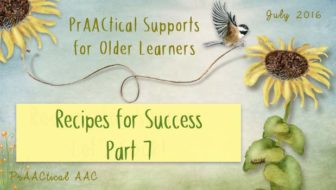
Welcome back to the PrAACtical Supports series, highlighting the work of the AT team at the Children’s Hospital of Richmond at VCU (CHoR). Meghan Reitz, an SLP who has worked at CHoR for over 3 years, returns to share activity ideas for older learners and downloadable handouts for their caregivers. She received her Master’s in SLP from the University of Virginia., which provides comprehensive services for pediatric healthcare. The CHoR AT Program is one of few comprehensive AT programs in Central Virginia, providing AT evaluations, equipment and training to people of all ages, enabling children and adults with disabilities to function more independently. CHoR’s AT team consists of 4 SLPs, 2 OTs, a PT, and a Therapy Practice Assistant. In addition to completing transdiciplinary evaluations and treatments, CHoR’s AT team is responsible for supporting staff and sharing AT information to five CHoR therapy centers throughout Central Virginia. Meghan has a passion for working... [Read More...]
Filed under: Featured Posts, PrAACtical Thinking
Tagged With: core vocabulary, download, Family support, older learners, partner training
April 14, 2016
by Carole Zangari -
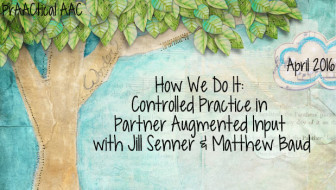
Today, we welcome back Dr. Jill Senner and Matthew Baud to talk about some of their strategies for implementing AAC. They have some great ideas for helping partners better support AAC learners. You can read some of their previous posts here. In the meantime, let’s see how they are helping communication partners develop their AAC facilitation skills. :::::::::::::::::::::::::::::::::::::::::::::::::::::::::::: Most of us already know that evidence-based research supports the use of partner-augmented input (PAI) as an intervention strategy for individuals who use AAC. However, simply having awareness of a strategy does not mean that one can easily use it. To quote Jim Knight, “We wouldn’t teach someone to drive by giving them a lecture, tossing them a book, and then turning them loose on the freeway.” Indeed, in order to learn a new skill, communication partners often need practice. In fact, one may need to try a new strategy or skill... [Read More...]
Filed under: Featured Posts, PrAACtical Thinking
Tagged With: augmented input, classroom, partner training, schools
April 9, 2015
by Carole Zangari -
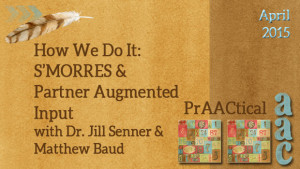
Mnemonics are such a great memory aid, so when Dr. Jill Senner and Matthew Baud offered to share the visual support that they use in their clinical work, I knew it would be of interest to many of you. Combine that with content on partner training, and we have a real treat for you: S’MORRES. Dr. Senner is the owner of Technology and Language Center where she specializes in providing AAC and AT services including assessment, consultation and training, and workshops/lectures. She has presented at numerous national AT conferences and has taught graduate courses in AAC and swallowing disorders. Matthew Baud is the Assistive Technology Coordinator at Niles Township District for Special Education, performing evaluations, trainings and coaching communication partners. Matthew also has his own AAC private practice, and is an adjunct professor at Saint Xavier University where he teaches a graduate course in AAC. In this post, they share S’MoRRES, a strategy for building... [Read More...]
Filed under: PrAACtical Thinking
Tagged With: aided language input, implementation ideas, Jill Senner, Matt Baud, partner strategies, partner training
November 27, 2013
by Carole Zangari -
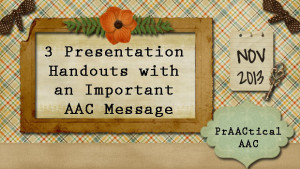
We don’t get to as many AAC conference presentations as we would like to, and are always appreciative when the speakers generously post their handouts online. Here are some that we think you might appreciate, too. Cathy Binger and Jennifer Kent-Walsh: What works in training partners of children who use AAC? Penn State: We need more SLPs who are well-trained in AAC. Sarah Blackstone, Krista Wilkinson, and colleagues: We are not paying enough attention to the emotional development of children with AAC needs. Development of Emotional Competencies in Children with Complex Communication Needs: Implications for Practice and Research Sarah Blackstone, Krista Wilkinson, Jen Thistle, with Gabriela Rangel, Dale Epstein, & Jacob Feldman If you know of other presentation handouts that prAACtical professionals might enjoy, please share the link below.
Filed under: PrAACtical Thinking
Tagged With: emotional competence, handouts, partner training, presentations, SLP training
November 18, 2013
by Carole Zangari -
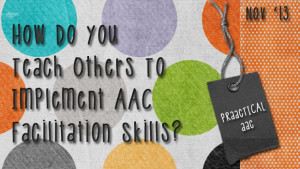
We’ve learned many ways to do this, but here’s one of our favorites. The idea originally came from a presentation by Dr. Beth Foley, Dean of the School of Education at Utah State University. The process is as elegant as it is simple. I do it, you watch me. I do it, you help me. You do it, I help you. You do it, I watch you. Do you have a favorite strategy for helping others become good AAC partners? We’d love to hear about it.
Filed under: PrAACtical Thinking
Tagged With: Beth Foley, partner training
February 22, 2012
by Carole Zangari -
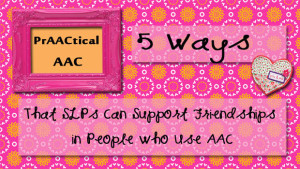
No feeling person could read Louise Kinross‘s post, My Child’s Dream: To Have Friends, without being moved. One of the most basic fervent wishes that all parents have is for their sons and daughters to make and keep friends. Disabled or not, parents fear loneliness for their kids, and rightfully so. Loneliness is a sharp and lasting pain. And, in many cases, completely unnecessary. Kinross’s post, brought to my attention by Ellen Seidman of (Love that Max), inspired me to generate this list of things that we SLP’s can and should be doing to support kids and families. is 1. Make friendship skills a priority: Are there friendship goals in the IEP? There could be. If you’re thinking about working on a social skill, take a step back and see if it makes sense to focus more specifically on communication skills in the context of making and keeping friends. Educationally relevant?... [Read More...]
Filed under: PrAACtical Thinking
Tagged With: friendship, partner training, social skills





